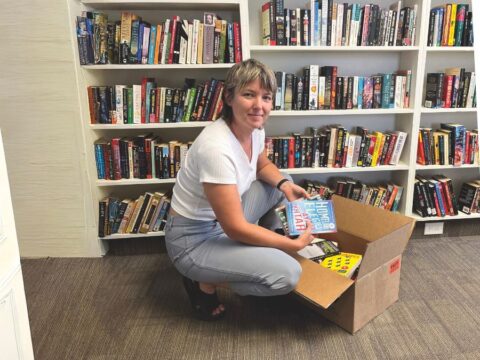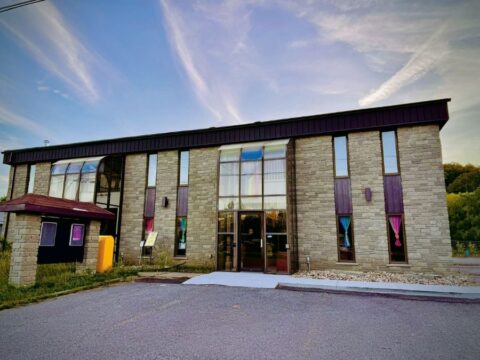Content warning: This story mentions suicide. Take care when reading.
“So now faith, hope, and love abide, these three; but the greatest of these is love.” These are the words from the 13th chapter of the first epistle to the Corinthians to which Bonnie, a born and raised Hamiltonian, keeps returning. And it’s that feeling of love, she said, that drew her to the candlelight vigil on Sunday afternoon to honour the life of Bekett Noble, a trans Redeemer University student who multiple news outlets have reported died by suicide on Nov. 23.
You may unsubscribe from any of our newsletters at any time.
Some 200 people gathered outside Hamilton, Ont., city hall in the biting cold, dressed for the weather, and additionally sporting pins with rainbow hearts inset over the phrase #DoBetterforBekett, rainbow flags and signs that read “Siding with Love,” “We hear you Bekett” and “Bad Theology Kills.”
Bonnie’s son is part of the 2SLGBTQIA+ community, and her family has always loved and supported them. On Sunday, she was present as a volunteer to support the organizers, Free Mom Hugs Southern Ontario. She was there, she said, to be “part of a community who shared love with others who didn’t otherwise feel it.”
Noble’s death is the latest tragedy to bring Redeemer University back in the news. The private Reformed Christian-associated institution in Ancaster, Ont., has struggled to negotiate and create a space where students who identify as queer or trans feel safe and supported. Redeemer University says it is protected under the Charter of Rights and Freedoms to establish a cultural environment that is in keeping with its religious values, particularly those pertaining to what they see as the sacrosanctity of heterosexuality. But a broad coalition of groups argue that one freedom cannot trump another at the cost of individual and community harm.
That freedom of religion is enshrined in the charter doesn’t mean that one can apply it to discriminate against another group of people, said Kojo Damptey, the executive director of the Hamilton Centre of Civic Inclusion, who was also at the vigil.
“You are entitled to have a [religious] university but the university has to be open to any and everyone,” including those who you think go against your religion. Governments and legislators should respond to the issue on the “freedom of religion” grounds, he said. Also, he said, “religious institutions cannot be exclusive, especially when some of them also have access to public funding.”
The root issue is about inclusion at faith-based educational institutions, like Redeemer University, where students encounter strict moral codes via policies that forbid sexual intercourse outside of marriage and only accept heterosexual relationships. Marriage, these policies state, can only be between a man and a woman, despite same-sex marriage legislation. There have been subtle changes but these appear to mask rather than address the issue. For instance, a prior policy dating back to 2013 specifically mentioned homosexual activity as being outlawed on campus; its revision indirectly targets homosexuality while also outlawing heterosexual premarital relations.
Such policies have raised concerns about creating a culture of discrimination; the university says the Ontario Human Rights Code protects its ability to create a space that supports its religious belief system. But other universities have also experienced similar conflicts. B.C.-based Trinity Western University’s law school application was rejected by the Supreme Court on the grounds that its policy, similar to that of Redeemer, discriminates against 2SLGBTQIA+ students.
View this post on Instagram
Moreover, many queer and trans students who attend Redeemer University are not entirely at odds with organized religion and their place in it.
Noble identified as Christian and advocated hard for inclusion while at Redeemer. They founded Genesis, a queer support group for students, and were on a committee on LGBTQ relations with faculty and student senate members. But despite the verbal show of support from the university, little changed on campus. In a letter that went out on Nov. 24 whose contents were reported by the Hamilton Spectator, Noble outlined their frustrations with the lack of action. They were asking for love to be centred in the university’s equation of community. They experienced, instead, a loss of hope.
Following Noble’s death, a Genesis statement paid tribute to their work but also reminded people that the students want to work with the university. “Genesis’ purpose is not to tear down Redeemer, but to make it a more welcoming environment for LGBTQ+ students; our aim is not to divide or oppose – we would like to lean into discomfort in order to become a more loving and diverse community of Christians, attempting to always reflect the love, compassion, and grace of Christ in all of our interactions within our community and beyond.”
More on Broadview:
- I quickly learned The Meeting House doesn’t accept same-sex relationships
- Canadian Blood Services’ policy change still stigmatizes queer community, says HIV/AIDS advocate
- Meet Theo Robinson, one of Canada’s first openly transgender Anglican priests
Even so, the students at Redeemer are up against a significant challenge. An unsafe campus culture for queer and trans people has long been present at Redeemer. It was documented in 2019 when students and alumni shared their concerns about a toxic campus culture in an internal document called the Rainbow Report. In it were individual testimonies about students’ cultural experiences on campus that forced many to hide their true identities and experience harm from those who traded in a language of homophobic slurs and barbs.
In a statement published on Dec. 10, Redeemer University acknowledged Noble’s advocacy and work, lowered its flag to half mast and held a memorial in their honour. But the university stopped short of committing to any steps or action it would take to address Noble’s concerns about student safety.
At the vigil on Sunday afternoon, another mother, Michelle, was there to support her son, John, who said he is openly gay and here to support others in the Hamilton community.
As a kindergarten teacher, Michelle said she is also thinking about future generations and the environment in which young children experience their first years of discrimination.
“One of the important things to bring home for me, and I don’t speak for everybody, in order for all our children to learn, they need to feel safe.”
***














